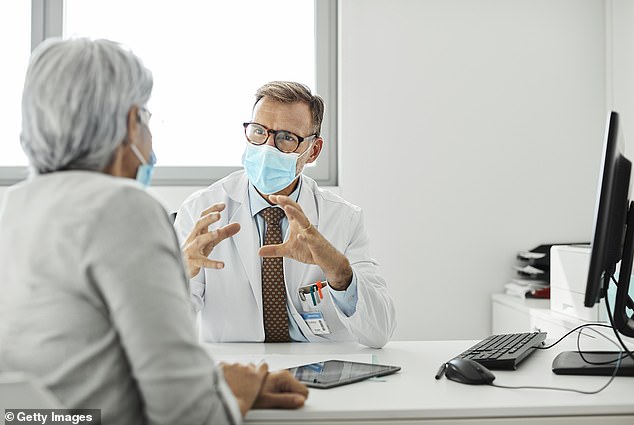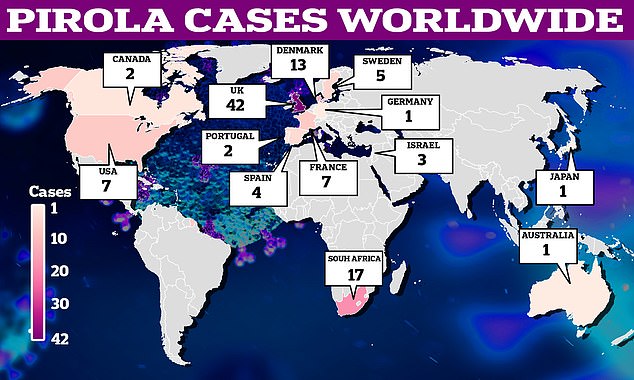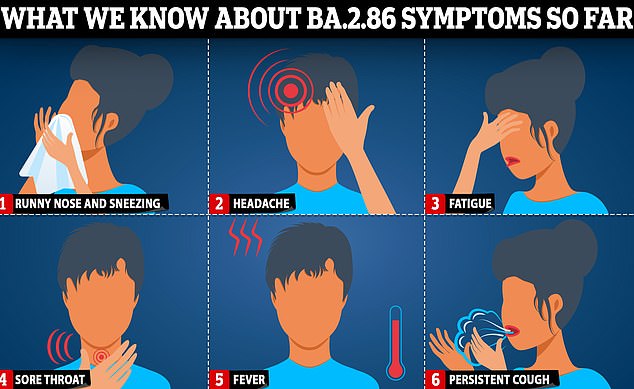GP practices are bringing back Covid masks for ALL patients as cases rise
A resurgence in Covid cases in the summer has prompted some GP surgeries to bring back face mask rules for patients – weeks after a new variant was spotted.
A practice in Leicester reintroduced guidelines last week, calling on people to mask up as a ‘precautionary measure’ to protect vulnerable patients.
Another in Essex warned that an ‘increasing number of patients and staff with Covid’ had led to the move.
A spike in infections across the country has seen Covid hospital admissions in England reach a five-month high.
Health officials confirmed yesterday that a total of 42 cases of the super-mutated Pirola Covid variant have now been detected in Britain, up from 36 last week.
The east of England had the highest number of cases thanks to a huge outbreak of 28 cases in Norfolk nursing homes in late August

A practice in Leicester reintroduced guidelines last week, calling on people to mask up as a ‘precautionary measure’ to protect vulnerable patients. Another in Essex warned that an ‘increasing number of patients and staff with Covid’ had led to the move. A spike in infections across the country has seen Covid hospital admissions in England reach a five-month high
Mukta Modi, manager of Canon Street Medical Center in Leicester, told GP magazine Pulse: ‘We are preparing for the autumn vaccination programs and this is a precautionary measure to protect staff and our vulnerable patients.
‘This has been discussed with our patient participation group, who have been very helpful.’
Dr. Grant Ingrams, chairman of the Leicester, Leicestershire and Rutland Local Medical Committee (LMC), told MailOnline today: ‘Every practice is different, with significant variation in the number of staff and patients at greater risk of getting Covid or developing complications to get.
‘In addition, many practices have very tight space, meaning patients have to sit or stand close together in reception and waiting areas.’
He added: ‘Practices are private businesses and have a legal duty to protect their staff and patients under health and safety legislation, including from infection.
‘Leicester, Leicestershire and Rutland LMC all support practices to carry out a risk assessment and implement the protection they conclude is necessary, including the wearing of masks.’
Although the true prevalence of the virus is unclear, data from the ZOE Covid study, which tracks self-reported infections, suggests that there were 97,904 new daily cases of symptomatic infection as of September 13 – almost double the 50,000 reported in early August .
The research, which is based on data from millions of ZOE app users, estimates that around 1.29 million people in Britain are currently infected, around one in 52 people.
The figure is the highest in five months, but that’s about it still much lower than the estimated toll during previous peaks, which reported 3.8 million people infected by April 2022.
Until June last year, patients were required to wear face masks in GP practices.
Updated NHS guidance told the practice at the time that patients, apart from those with respiratory symptoms, are ‘not required’ to wear a face mask unless they wish to do so as a ‘personal preference’.
However, health and care staff were advised to continue wearing face masks as part of personal protective equipment when working with suspected or confirmed Covid patients, including those working with untested patients in primary care.
It comes as a caller, known only as Caroline, spoke to TalkTV on Wednesday and claimed the unnamed GP practice where she works in Essex had asked staff to ‘re-mask’.
A message sent to staff earlier this week said: ‘Due to an increasing number of patients and staff with Covid, I am afraid we will have to ask you to wear a face mask at work again from tomorrow.
‘Hopefully, by wearing them again during the corona crisis, we can protect and care for each other and set an example for patients.’
The message also confirmed that the practice would review “regular mask wearing,” she claimed.
She told TalkTV: ‘I messaged back and said I wouldn’t wear them and that I would try to keep my distance if they were concerned.
“They also wanted us to test again if we weren’t feeling well.”

More than 100 cases of Pirola have been discovered worldwide, including in Denmark, South Africa and the US

Virologists have warned that it is too early to reliably diagnose specific symptoms, but these may include a runny nose, sore throat and fatigue
In recent weeks, scientists have recommended a return of pandemic mitigation measures, including wearing masks, and increased ventilation due to the virus’s resurgence.
Some virologists have done that too urged ministers to reconsider vaccine eligibility criteria after the government last month abandoned plans to offer Covid vaccines to under-65s as part of the rollout of the autumn shot that started on Monday.
Despite some experts questioning whether they were ever necessary, studies have repeatedly shown that wearing masks can reduce transmission of the virus.
Last month, a report from the Royal Society also found that ‘wearing masks and making masks mandatory was an effective approach to reducing infections’.
Researchers said studies consistently reported the measures were an effective approach to reducing infections, despite officials expressing mixed messages about their effectiveness early in the pandemic.
Other evidence from healthcare studies also showed that higher quality respirators – such as N95 masks – were “more effective than surgical masks,” she added.
However, researchers noted that as the pandemic progressed and the virus became more transmissible, non-pharmaceutical interventions (NPIs) became less effective at controlling the spread of the virus.
It comes after UKHSA data yesterday showed Covid hospital admissions are at their highest level since April.
The number of admissions among patients who tested positive for the virus was 4.6 per 100,000 people in the week to September 10, official figures show.
This is an increase from 3.7 per 100,000 the week before and the highest since the week ending April 30.
This is still a fraction of the level reached last winter, when the rate was 11.8 per 100,000. It is also well below the figures from the first year of the pandemic.
However, interest rates have shown a clear upward trend over the past two months.
The rates remain highest among people aged 85 and over, at 51.1 per 100,000, and among 75 to 84-year-olds, at 21.2 per 100,000.
Experts predict that Covid cases will continue to rise as Britain moves into autumn and people socialize more indoors.
Britons are also no longer testing en masse as they did earlier in the pandemic – with community testing ending in May 2022.
Therefore, the confirmed cases are an underestimate of how many Britons are infected with Covid and how many of those have the new Pirola variant.
Yesterday, UKHSA confirmed that a total of 42 cases of the super mutated strain, scientifically known as BA.2.86, have now been detected in Britain, up from 36 last week.
Of the 37 cases in England detected on September 11, seven were hospitalized, while two were detected among A&E patients. No deaths have been recorded among those infected.
There are approximately 5 cases of BA.2.86 reported by Public Health Scotland. No Pirola cases have been detected in Wales and Northern Ireland.
Pirola, like other recently emerged Covid variants, is a spin-off of the Omicron strain.
However, the large number of mutations, 35 in total, raised alarm, with some experts fearing it would be different enough to effectively evade the protection provided by Covid vaccines and infections from previous waves.
The UKHSA said it is currently analyzing blood samples from NHS workers to test how effective the immune response generated by Covid jabs is against Pirola.
Experiments to determine how effective lateral flow tests are in detecting Pirola are also ongoing.
